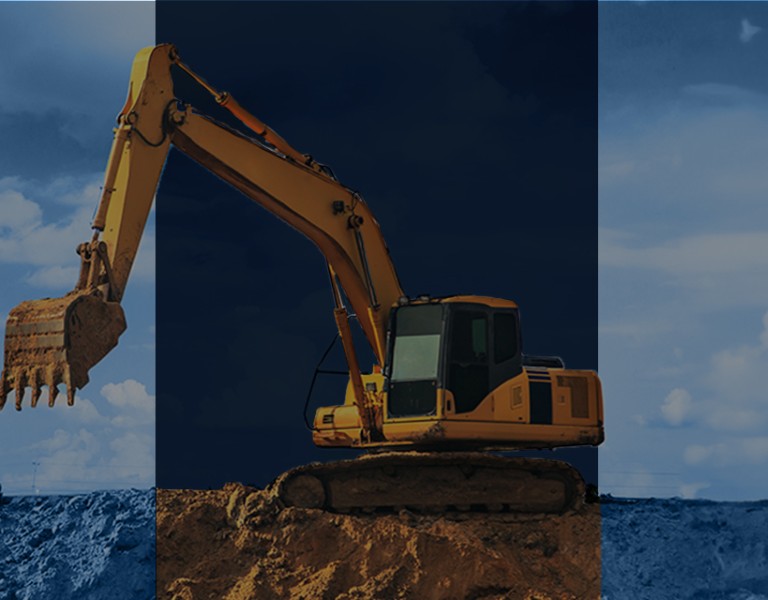No industry is immune to change.
The industrial equipment and machinery manufacturing and rental industry is no exception to this rule. In addition to ongoing supply chain disruptions and economic pressures, the industry is grappling with structural industry changes that threaten to change their business. The shift to e-commerce means that even industrial equipment manufacturers cannot simply sell machinery and must shift their focus towards equipment lifecycle. Direct-to-consumer sales models are also fast gaining momentum in the industry, with consumers looking to ‘build and price’ their ideal model. With change coming in fast, this blog explores some of the key challenges faced by the industrial equipment and machinery manufacturing and rental industry, as well as how businesses can gear up for these shifts with the right technology and digital capabilities.
Industrial equipment manufacturing and rental industry: Unique requirements at hand
The industrial equipment, machinery manufacturing and rental industry encompasses companies that produce and lease machinery in various sectors, not limited to construction, aviation, manufacturing, forestry and mining. These industries play a crucial role in the global economy by providing the tools and equipment necessary for infrastructure development and industrial operations. The players in this industry often have several unique requirements due to the business environment they operate in, as detailed below.
- A make-to-order environment: The technology in place must support a make-to-order environment where orders for the manufacture or rental of equipment are designed according to unique customer specifications. Solutions must, therefore, have the flexibility to adjust build configurations as needed.
- Operational complexity: Heavy machinery manufacturers, in particular, need to dive into greater depth and granularity as large, complex builds often consist of several separate work orders or even separate sales orders and quotes. This is where technology can help drive visibility and traceability of all elements related to a project, including data on labor, materials, ancillary services, and total costs.
- Demand ebbs and flows: Visibility into demand is also crucial as demand can fluctuate in this industry and businesses need to proactively manage their workforce and operating expenses, together with changing lead times from suppliers. There is also a need to streamline and standardize processes as it is a highly regulated industry with complex, intricate workflows.
- Total lifecycle management: Businesses require solutions that support service and repair management, track warranties, and schedule and facilitate maintenance calls. The mobile nature of the service business also means that robust mobile functionality is key to this industry.
- Risk of parts overstock/stockouts: Parts in the industrial equipment and machinery industry is incredibly important. Take for example Caterpillar (CAT) – equipment parts contribute to a significant portion of the business’ revenue. A CAT dealer has to keep critical parts for machines over a 20–30-year lifecycle which ties up a lot of capital. The Poisson Tables feature in the Infor ERP addresses this concern by offering visibility into factors like supply lead time and safety stock.
Industrial equipment and machinery manufacturing: Fraught with challenges
Industrial machinery and equipment manufacturers face multiple challenges in the current market. A pressing issue is declining productivity and skills shortages which hampers the industry’s ability to meet production demands and can equally affect innovation. To meet this challenge, companies must invest in workforce development, training, and automation to compensate for the shortage of skilled labor.
Rising material and labor costs, along with high energy costs and inflation can squeeze profit margins for manufacturers. To mitigate this challenge, businesses must optimize their supply chains, explore alternative materials, and look to adopt energy-efficient technologies. It is also important to adjust pricing strategies as required to ensure the business remains competitive.
The growing product and solution complexity means that to meet the demands of consumers, manufacturers must make considerable investments in research and development. Companies must be able to adapt by enhancing their engineering capabilities and staying updated on emerging technologies, industry trends and sustainable options.
The demands for rapid time-to-market and customization can put pressure on manufacturing processes. Businesses should consider adopting digital design and manufacturing tools and agile methodologies to accelerate the time-to-market and meet customer demands for bespoke solutions.
Adhering to compliance and safety regulations is crucial in this industry to protect the safety and wellbeing of workers, consumers and the environment. This requires investment in occupational health and safety measures, training, and quality control.
The shift towards ‘As-a-Service’ models, including subscription-based services and predictive maintenance contracts can provide new revenue streams. However, companies should invest in technology such as data analytics and AI to offer these services effectively.
Industrial equipment and machinery rentals and leasing: Rental woes
The rental industry also grapples with significant challenges as there is a need to manage complex reservations and pricing models. Equipment availability is also of concern as machinery needs to be allocated on time to various consumers. This goes hand in hand with the processing of equipment returns to the existing inventory.
Infor M3 and CloudSuite provides asset tracking capabilities, ensuring that rental companies can monitor the location and status of their equipment in real-time. This feature helps in complying with safety and compliance regulations by enabling companies to locate and inspect rental machinery as swiftly as possible.
Machinery maintenance also needs to be tracked on time, as it is vital that models are up-to-date and fully comply with the latest safety regulations. Finally, the utilization of such equipment needs to be tracked and monitored, to ensure that they are being managed for maximum profitability.
Turning the tide for manufacturers, with technology
Dealing with such a plethora of issues may seem to be a daunting task, but technology can help businesses navigate these issues.
When it comes to make-to-order environments and build configurations, the technology leads the way, for example through the use of ERP systems which can track orders and production processes. Coupled with automation and AI technology, this suite of technologies can help businesses automate the quoting and pricing process as it considers various factors such as material costs and labor to generate accurate and competitive quotes. Infor M3 and CloudSuite help industrial machinery and equipment manufacturers simplify their operational complexity by streamlining the full spectrum of activities, from the supply chain and the entire manufacturing process to sales, service, distribution and financial management. Infor ERP’s industry-specific functionality also allows manufacturers to optimize the utilization of equipment and manage the quality of products.
When it comes to handling large, complex builds in the industry, Infor M3/CloudSuite can create and manage bills of materials (BOMs) for each work or sales order to support version control, revisions, and traceability. Infor M3 can also provide up-to-date, real-time viewing of the availability of components and materials, the tracking of costs, and financial data associated with each project component.
To handle fluctuating demand and manage workforce and operating expenses, Infor M3 can integrate multiple sets of data from different applications and departments across a product’s life cycle, helping businesses better manage all aspects of the process such as customer orders, sales forecasts and supplier information. This can streamline operations, while AI technology can transform this data and aid in trend forecasting.
With respect to the industry being highly regulated with complex, intricate workflows; Infor M3/CloudSuite can help ensure that suppliers are closely evaluated and approved. Manufacturers can also look to automate the monitoring of supplier performance and compliance with predefined criteria. The technology can also be used for standardized training and onboarding of employees to ensure they are properly equipped to deal with regulatory protocols; and all training materials, assessments and certifications can be managed within the system. The enterprise analytics functionality can be used to gain insights into cost structures and help make data-driven decisions to optimize costs and pricing strategies which can help deal with rising material and labor costs.
Infor M3/CloudSuite allows manufacturers to configure equipment to meet customers’ exact specifications in the shortest time possible, and this helps address the complexity of meeting diverse machinery needs as efficiently as possible.
Compliance is guaranteed with the document capture functionality in an ERP like Infor M3/CloudSuite which allows the managing of compliance documents by digitally processing and classifying all related material. Finally, Infor M3/CloudSuite enables the creation of quotes for various business models, including predictive maintenance contracts, which can help manufacturers adapt to changing revenue models.
Digital capabilities to help the equipment rental industry soar
The powerful industry-specific capabilities of Infor M3 and CloudSuite can assist in managing service and maintenance schedules efficiently. This ensures that rental equipment complies with safety regulations and the focus on first-time-fix (FTF) repairs improves equipment reliability and minimizes downtime which in turn enhances safety. Take for example the Rental Planning Board feature in the Infor ERP – it gives businesses a quick snapshot of the items that are on rent/hire and unavailable for other rentals, when they are due back, how much time it will take to service them and make them available for hire again, and what unique ‘as-built structures’ or configurations they have. Industrial equipment and machinery rental and leasing companies that need to allocate machinery as efficiently as possible will benefit from the production scheduling tools which can aid in balancing equipment availability with customer demands.
From checking inventory quickly and tracking assets in real-time, to managing complex equipment quotes and configurations and setting up/applying flexible discount structures, Infor’s industry-specific solutions address the unique needs of the rental industry. Infor’s solutions have demonstrated significant improvements in KPIs for leading equipment OEMs, dealers, and rental organizations, such as a $9 million annual revenue increase through improved price guidance and 7-13% improvement in FTD repairs. These improvements also contribute to safety compliance by enhancing equipment reliability and profitability.
Infor M3/CloudSuite’s rental analytics functionality allows rental companies to tailor pricing based on historical data and customer demand, which can provide valuable insights into equipment utilization and thus help in optimizing pricing models. Infor M3/CloudSuite’s capabilities can be used to manage customer relationships and agreements effectively. This includes structuring and controlling lead-to-sales processes and managing customer agreements.
Mobile field service capabilities can allow rental companies to track equipment maintenance in real time. Thus, service technicians can access equipment history and repair instructions to ensure full compliance with safety regulations. Technologies like Artificial intelligence (AI), the internet of things (IoT), and machine learning (ML) can also help provide advanced monitoring and diagnostic capabilities to minimize costly downtime. The tracking and monitoring of rental equipment can be automated to provide insights into equipment performance, defects, and alarms to draw attention to areas where equipment may require more careful handling or maintenance.
Paving a smoother road
While it is clear that the world we live in continues to be an uncertain one, and technology can lead the way in ensuring that businesses can operate swiftly, smoothly and safely. The Infor M3 and CloudSuite of products and Fortude are uniquely positioned to handle these challenging times in the equipment machinery, manufacturing, and rental industry, in more ways than one. Speak to our Infor-certified experts to learn more about how your business can accelerate its growth track: https://fortude.co/services/infor-erp-consulting/
- Industrial equipment manufacturing and rental industry: Unique requirements at hand
- Industrial equipment and machinery manufacturing: Fraught with challenges
- Industrial equipment and machinery rentals and leasing: Rental woes
- Turning the tide for manufacturers, with technology
- Digital capabilities to help the equipment rental industry soar
- Paving a smoother road
Subscribe to our blog to know all the things we do


